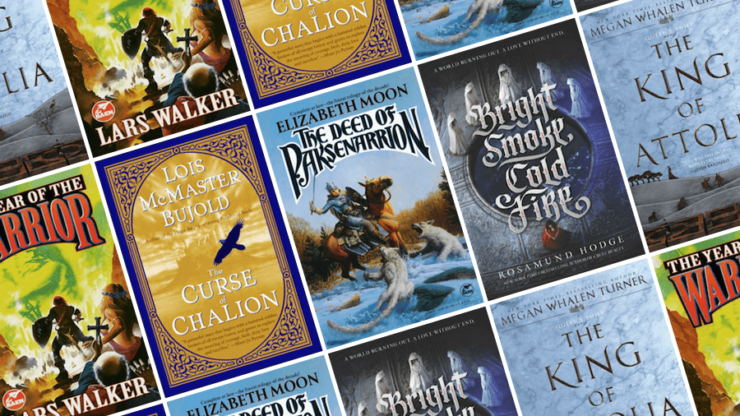The defining feature of fantasy is the reality of the supernatural within the narrative—whether the supernatural element in a given story involves magic or gods or some other force-yet-to-be-defined. Yet in my favorite fantasy books, what fascinates me isn’t the magic, and it isn’t the gods. It’s the characters that I think of as the saints, not in the strictly religious or Christian sense, but those who dedicate themselves fully to a higher power—those crazy-dedicated, all-in, vision-haunted warriors and children and priests.
More than that, it’s the costliness of fantasy sainthood. In the most moving fantasies, those who choose to follow their god or goddess or magical deity end up paying a price for it. Sainthood doesn’t come free.
Yet even though the risk of losing everything is clear, these books also make it plain to the protagonist that this is only path truly worth taking. Sure, you might lose everything, but this is still the way to beauty and glory. The only thing to do is to put your life—your very self—on the line. Not that it’s the only sensible thing to do—it’s not sensible at all. Just that it’s the only thing there is to do—at least for someone like the protagonist, who has seen something of the divine, and now can never unsee it. Nothing else will satisfy. Nothing else will even come close.
Here are five fantasy books in which sainthood costs everything, and where, even with all their free will intact, the protagonists find themselves unable to choose anything but the painful path their gods lay before them.
The Curse of Chalion by Lois McMaster Bujold
Buy the Book
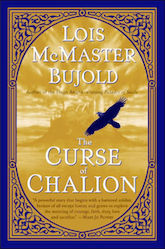

The Curse of Chalion
Bujold’s hero, a washed-up soldier named Cazaril, starts the book not as an atheist, but as a downtrodden, defeated believer: He did trust in the gods, and they failed him. But the plot—and the divine Lady of Spring—swiftly snatch Cazaril up from his (well-earned) depressive state. He finds himself carried along into an adventure that asks everything of him—and takes everything, too.
In the middle of Cazaril’s terrifying journey, someone offers him a metaphor of sainthood by turning a cup upside down and trying to pour wine into it, showing that—with all their power—the gods cannot control a human being without permission. “Men’s will is free,” Caz’s companion says, “The gods may not invade it, any more than I may pour wine into this cup through its bottom.”
The fascinating implication of the inverted wine cup is that while free will matters, your choices are limited: accept the gods’ offer or reject it. And while you control your choice, you don’t control its outcome. Give everything and perhaps you get everything…or maybe you don’t. It’s not up to you. You are not the god or goddess. You are just the poor sap who got caught up in the gears of the adventure. You might get smushed.
Or you might give your life and, in return, find your life again—and find it utterly transformed.
The King of Attolia by Megan Whalen Turner
Buy the Book
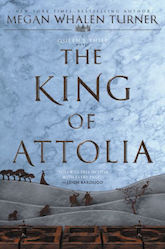

The King of Attolia
Like most of Turner’s Attolia books, this one takes a delightful, sneaky turn mid-story, which means that to discuss the relevant part, I need to give a small spoiler warning. (And here it is: consider yourself warned.)
The delightful secret of this book is that what seems to be a political novel is actually a theological one (though in Turner’s world, the theology and the politics are inexorably intertwined). The real struggle in the novel isn’t between the new king and his (disdainful, possibly rebellious) subjects—no, the real conflict in this story is the incredibly fierce fight that the new king is having with his god. The king is determined that he shall not be a true king, but his god is just as determined that he shall. By choosing a narrator who is not the protagonist, Turner obscures the main players and themes of the story, skillfully dancing and feinting like a trained duelist.
The concepts of free will and inevitability that Bujold is sketching with in Chalion are echoed here, and maybe even expanded—but the most interesting part is how both authors refuse to reject either free will or fate. It seems they must go together for either to mean anything.
The Deed of Paksenarrion by Elizabeth Moon
Buy the Book
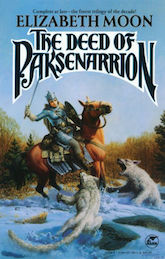

The Deed of Paksenarrion
Paksenarrion’s story is very much a farm-boy-goes-on-the-hero’s-journey story except for one thing: the farm boy is a farm girl. That fact—especially in a story that was first released over a quarter century ago—makes all the difference. Many religious traditions in our own world celebrate both the active and the contemplative paths to holiness. Paksennarion, with her many deeds of valor, definitely gives the reader a chance to ponder what active sanctity might look like.
But the real magic of Moon’s tales (and in this long, winding trilogy, we encounter more stories than just Paks’ own) comes in the way she marries absolute goodness with almost unbearable suffering—I say “almost” only because, even when her saints’ suffering extends all the way to the most wretched deaths, these characters are never forsaken. This is not just death, it is love-unto-death: the love that lays down its life for the beloved, and the beloved that is utterly worth the sacrifice.
Not that it’s always a quid pro quo situation. Some fantasies have a consistent, rules-based magic, and while that kind of precise world-building makes for some very satisfying plots, it takes out an element of the risk. In those stories, you know that if you do X and Y with the magic, then Z will result. Moon’s world, by contrast, has magic, and it matters, but the rules simply aren’t that cut-and-dried. I admit to loving the added nail-biting tension that comes when I, as the reader, am just as unsure about what the gods can and can’t (or will and won’t) do as the protagonist is.
The Bright Smoke, Cold Fire duology by Rosamund Hodge
Buy the Book
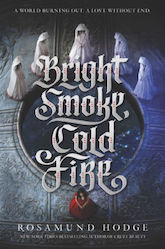

Bright Smoke, Cold Fire
Hodge’s world of Viyara is a bit different from the previous examples in that it might or might not have gods—the various groups of people still alive in the story’s one surviving post-apocalyptic city disagree on the subject of the gods’ reality.Our protagonist, Runajo, doesn’t believe in the gods, but she does believe in the power of blood, and of death, and of sacrifice. She has good reason for her beliefs, too: her city only survives because of the magic wall that surrounds it—a wall that is kept alive through the blood sacrifices of its people.
One of the squickiest, awesomest moments in this story (Hodge is a delight when it comes to combining the grotesquely awful with the beautifully noble) comes when Runajo, as a newly-pledged Sister of the Thorns, must undergo penance. “Penance,” in Viayara, means sitting down and letting the city unwind some of its decorative stonework into long, smooth, rock-tentacles that then plunge themselves into your veins and drink your blood.
It’s a terrible, invasive kind of a sacrifice, and one that feels inherently wrong to Runajo—and, indeed, to anyone who undergoes it. What makes Runajo a heroine to cheer for is that she isn’t satisfied with this kind of sacrifice. If it were enough to save her city, she might be. But, along with her fellow protagonist, Juliet Catresou, Runajo can see clearly that the magic holding up the city’s walls is still failing, and the rest of her adventures are propelled by a keen desire to find the right sacrifice: not something messy and ineffective, but something dire and permanent.
It leads her to places she never expected to go, and into the discovery of relationships—both divine and human—that she never expected to encounter.
The Year of the Warrior by Lars Walker
Buy the Book
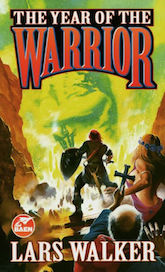

The Year of the Warrior
Though Walker’s book is the only one on this list that ostensibly takes place in the real world, it’s a story about a false priest. Aillil is an Irishman taken captive in a raid. To save his skin, he pretends to be a holy father. He lives out the rest of the book in a land far away from his home, carrying out his charade as best he can in a world that suddenly seems charged with the supernatural—for both good and ill.
Aillil is probably the least likable protagonist on this list—he’s certainly the least noble. He is a vice-ridden man, and even though some of the causes of his suffering aren’t his fault, a lot of them are. Yet even though he’s mostly comfortable in his sins, he isn’t allowed to stay the way he is—as he discovers the reality of the supernatural after his capture, his false profession of faith becomes terribly real, and the need for him to be a realpriest in a land filled with demons and worse becomes terribly urgent.
I love this book for its clear insistence that sainthood requires transformation. In order to follow the call, Aillil must change. He can’t stay the man he is: sort of bad, sort of good, mostly selfish and sorrowing. He has to be courageous—worse yet, he has to be charitable. If there is real evil in the world and real good, he has to pick a side, and then he has to let that choice manifest itself and become real in his own self—living it out in his own inclinations and actions and habits.
And that might be the most costly sacrifice of all.
Jessica Snell lives in Los Angeles with her husband and their four children. When Jessica’s not writing or editing, she enjoys knitting, gardening, and traveling up to the mountains whenever she can. You can follow her on Twitter @theJessicaSnell. Her work has appeared in Compelling Science Fiction, Daily Science Fiction, and Tales from Plexis (DAW Books).










